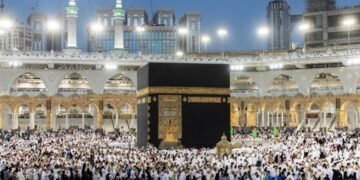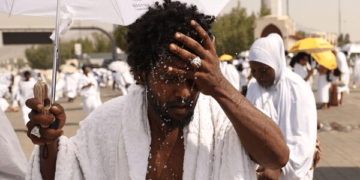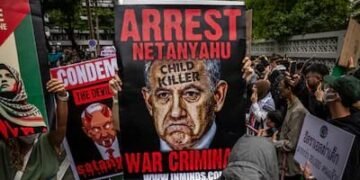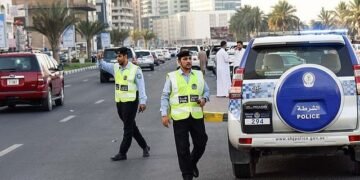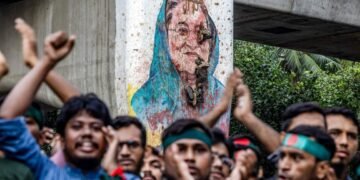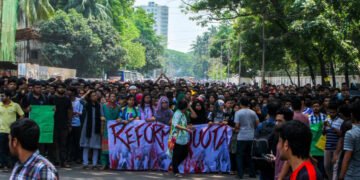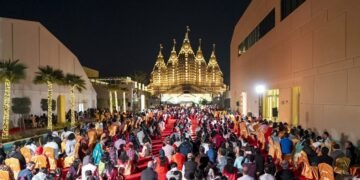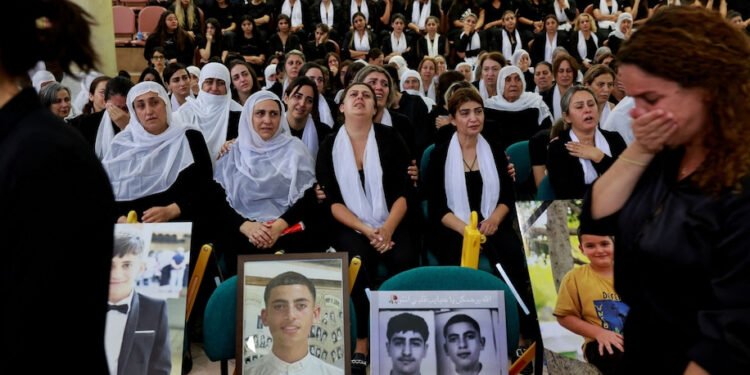The military said it killed Fuad Shukr, whom it called a “senior military commander,” in retaliation for a deadly rocket strike in the Golan Heights.
The strike, which threatened to escalate hostilities between Israel and Hezbollah at a combustible moment, occurred around 7:45 p.m. local time in the suburb of Haret Hreik. Lebanon’s Health Ministry said the strike killed a woman and two children. Televised footage showed several ambulances leaving the scene of the strike, residential streets choked with smoke and debris, and a multistory building partially destroyed with several floors collapsed.
Israel carried out an airstrike in a densely packed neighborhood on the outskirts of the Lebanese capital Tuesday, in an attack that it said killed a senior Hezbollah commander responsible for the deaths of 12 children over the weekend in the Israeli-occupied Golan Heights.
In a statement, the Israeli military said the strike had killed Fuad Shukr, whom it called Hezbollah’s most “senior military commander.” Shukr, the statement said, was Hezbollah leader Hasan Nasrallah’s “adviser for planning and directing wartime operation,” directing the group’s attacks against Israel during the war in Gaza.
Hezbollah on Wednesday confirmed that Shukr was in the building but said it was still working to remove rubble so it could determine his fate.The United States previously offered a reward for information on Shukr, whom it accused of playing “a central role” in the 1983 bombing of the U.S. Marine Corps barracks in Beirut, which killed 241 U.S. military personnel.
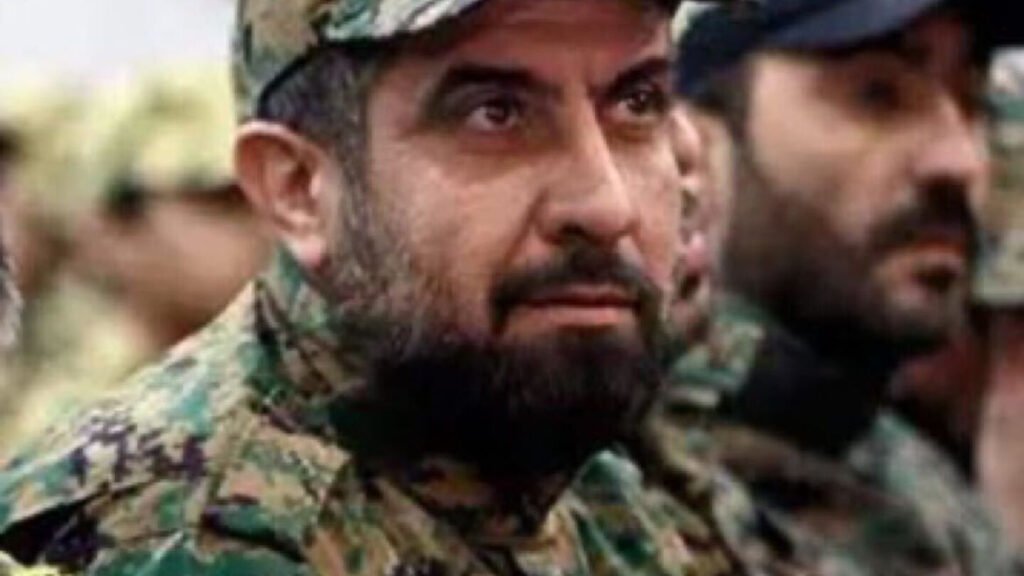
Lebanon has been bracing for war since Saturday, when a projectile hit a soccer field full of children in Majdal Shams in the Golan Heights. Israel immediately blamed Hezbollah and vowed that it would pay a “heavy price.” The United States also said Hezbollah was responsible: “It was their rocket, and launched from an area they control,” National Security Council spokeswoman Adrienne Watson said in a statement Sunday. Hezbollah denied it was behind the strike.
On Tuesday, as the two traded fire across the border, Israel said a civilian was killed after suffering shrapnel wounds in one of Hezbollah’s rocket attacks. Hezbollah said its rocket salvos were also fired in retaliation, for civilian casualties in an Israeli raid. The Lebanese group, an ally of the Palestinian militant group Hamas, has long said it would end its attacks on Israel in the event of a cease-fire in the Gaza Strip.
As tensions spiraled, diplomats continued to race to fend off a war. Defense Secretary Lloyd Austin on Tuesday voiced hope that the conflict can be defused diplomatically, while also saying the United States will defend Israel if it is attacked by Hezbollah.
“I don’t believe that a fight is inevitable,” Austin told reporters after meetings in Manila with senior Philippine officials alongside Secretary of State Antony Blinken to detail new security commitments for the Southeast Asian nation. “We would like to see things resolved in a diplomatic fashion.”
But “if Israel is attacked, yes, we will … help Israel defend itself. We’ve been clear about that from the very beginning,” Austin said.
Israel’s security cabinet authorized a military response to the weekend attack, but the specific nature of that counterstrike remained unclear, even as civilians on both sides of the Israel-Lebanon border — and the region at large — braced for it.
Israeli Prime Minister Benjamin Netanyahu said Monday that Israel “will not, and cannot, ignore this,” before vowing to retaliate: “Our response will come, and it will be severe.”
But despite the threats, officials from Lebanon, the United States and even Israel had voiced a sense as recently as Tuesday that Israel’s response — while all but guaranteed — might be calibrated to prevent a larger conflagration.
In an interview early Tuesday, Lebanese Foreign Minister Abdallah Bou Habib said he expected the response to be limited. He said in an interview in his office that Lebanon had heard from “a lot of friendly countries that deal with Israel” that “there will be a response, and this response will not lead to war.”
The information, he added, was provided with the understanding that it would be passed on to Hezbollah, in the expectation that the group’s response “should also not lead to war.” But in a telephone interview later Tuesday, he said he had not expected a strike on Beirut and that Lebanon would go to the U.N. Security Council to ask for condemnation of that attack.
“The shock is doing it in the capital,” he said, “not the action itself.”
A senior U.S. official, speaking Tuesday before the strike in Beirut, said the Biden administration was pushing the Israelis for “maximal calm” and was optimistic that the Israelis would listen. The official, who spoke on the condition of anonymity because of the sensitive discussions underway, said the United States believed the Israelis were not interested in escalation while acknowledging they had a right to retaliate in some way.
Ideally, the official said, that would take the form of airstrikes on Hezbollah members in southern Lebanon, where Israeli attacks have been concentrated. But the killing of an Israeli civilian Tuesday had made the best-case scenario more difficult, the official said.
Israeli officials signaled that they intended the Beirut attack Tuesday to be their answer to the Saturday strike.
“Israel is making it clear to its friends that they want this to answer the deaths of children without leading to regional war,” said a regional diplomatic official familiar with efforts over the last two days to persuade Israel to show restraint. “The hope is Hezbollah will respond the same way.” The official spoke on the condition of anonymity because of the sensitivity of the issue.
“We have finished our retaliation, and we have no intention of starting a regional war,” an Israeli official told Israel’s Channel 12 news.
Lebanon’s Health Ministry said 68 civilians were injured in the attack, including five people who were in critical condition.
“Hezbollah crossed the red line,” Israeli Defense Minister Yoav Gallant said in a post on X after Tuesday’s strike.
Here’s what else to know
The Gaza Health Ministry declared a polio epidemic Monday, more than a week after Israel’s Health Ministry said it had detected strains of the virus in sewage. No polio cases have yet been reported. The Gaza ministry said obtaining potable waterand access to soap and disinfectants for the strip’s residents were crucial to stopping the spread of the disease. The breakdown of Gaza’s sanitation systems has also led to increases in hepatitis A, dysentery and gastroenteritis, according to Palestinian and U.N. officials.
Israeli troops pulled out of eastern Khan Younis on Tuesday, ending a more than week-long incursion into the southern Gazan city that sent tens of thousands of displaced civilians fleeing. The Israel Defense Forces in a statement said that it “eliminated over 150 terrorists” in addition to weapons and infrastructure. Muhammad al-Mughair, an official with Gaza’s Civil Defense, told The Washington Post that emergency crews recovered the bodies of 42 people after troops withdrew, while more than 200 people remained missing. In recent weeks, Gazans packed into the strip’s southern and central regions have been repeatedly displaced by Israeli evacuation orders that now cover most of the territory, according to the United Nations.
Western governments have been urging their citizens to leave Lebanon. Rena Bitter, the U.S. assistant secretary for consular affairs, urged Americans to leave before a crisis begins, while the British Foreign Office advised its citizens “against all travel to Lebanon.” Sweden, Ireland and France issued similar statements. Meanwhile, Cyprus said itis ready to receive and help repatriate civilians if tensions between Israel and Lebanon worsen. Germany and Greece’s national carriers have paused flights to Beirut for the remainder of this week.
Attacks and discrimination against Muslims and Palestinians in the United States rose by 70 percent in the first half of 2024 compared with the same period from 2023, the Council on American-Islamic Relations said Tuesday. The group said it received 4,951 complaints about anti-Muslim and anti-Palestinian incidents regarding “immigration and asylum, employment discrimination, education discrimination and hate crimes.”
At least 39,400 people have been killed and 90,996 injured in Gaza since the war began, according to the Gaza Health Ministry, which does not distinguish between civilians and combatants but says the majority of the dead are women and children. Israel estimates that about 1,200 people were killed in Hamas’s Oct. 7 attack on Israel, including more than 300 soldiers, and says 329 soldiers have been killed since the launch of its military operation in Gaza.




